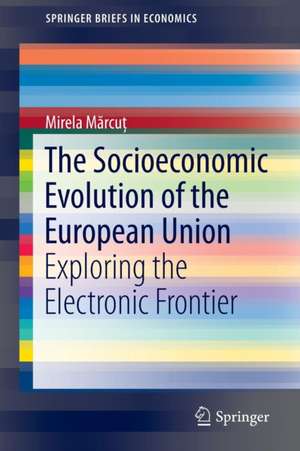The Socioeconomic Evolution of the European Union: Exploring the Electronic Frontier: SpringerBriefs in Economics
Autor Mirela Mărcuțen Limba Engleză Paperback – 24 iun 2016
What happens when the Internet collides with new social and economic borders? In the past borders have been perceived from only a national state point of view. Now new types of borders or frontiers, such as social, economic, ethnic, religious frontiers, can be discussed. The electronic frontier is the result of a socio-economic analysis of the relationship between the Internet and new frontiers in society and the economy. The European space best represents the fluidity of borders and frontiers within this transformation. Thus, the European Union is the best space to perform research on the electronic frontiers. Borders are permeable or impermeable, agents of inclusiveness or of exclusion. The relations between the real space and the virtual space, but also the influence of the Internet on society, lead us to two other important concepts for our research, namely digital divide and digital inclusion, which define connections or barriers even within the virtual space.
This book attempts to answer questions such as:
- What types of borders have information and communication technologies created in Europe?
- Which is the foundation of these new frontiers?
- How does the network society function in Europe and which type of frontier prevails?
Din seria SpringerBriefs in Economics
-
 Preț: 444.35 lei
Preț: 444.35 lei -
 Preț: 264.79 lei
Preț: 264.79 lei - 15%
 Preț: 462.51 lei
Preț: 462.51 lei -
 Preț: 47.33 lei
Preț: 47.33 lei -
 Preț: 353.14 lei
Preț: 353.14 lei -
 Preț: 273.32 lei
Preț: 273.32 lei -
 Preț: 376.04 lei
Preț: 376.04 lei -
 Preț: 379.09 lei
Preț: 379.09 lei -
 Preț: 380.07 lei
Preț: 380.07 lei -
 Preț: 377.35 lei
Preț: 377.35 lei -
 Preț: 379.09 lei
Preț: 379.09 lei -
 Preț: 376.59 lei
Preț: 376.59 lei -
 Preț: 408.27 lei
Preț: 408.27 lei -
 Preț: 379.09 lei
Preț: 379.09 lei -
 Preț: 383.28 lei
Preț: 383.28 lei -
 Preț: 378.54 lei
Preț: 378.54 lei -
 Preț: 377.95 lei
Preț: 377.95 lei -
 Preț: 340.23 lei
Preț: 340.23 lei -
 Preț: 380.25 lei
Preț: 380.25 lei -
 Preț: 378.12 lei
Preț: 378.12 lei -
 Preț: 376.04 lei
Preț: 376.04 lei -
 Preț: 376.04 lei
Preț: 376.04 lei -
 Preț: 379.68 lei
Preț: 379.68 lei -
 Preț: 381.00 lei
Preț: 381.00 lei -
 Preț: 375.23 lei
Preț: 375.23 lei -
 Preț: 376.80 lei
Preț: 376.80 lei -
 Preț: 378.54 lei
Preț: 378.54 lei -
 Preț: 377.57 lei
Preț: 377.57 lei -
 Preț: 376.04 lei
Preț: 376.04 lei -
 Preț: 378.92 lei
Preț: 378.92 lei -
 Preț: 375.62 lei
Preț: 375.62 lei -
 Preț: 379.09 lei
Preț: 379.09 lei -
 Preț: 353.67 lei
Preț: 353.67 lei -
 Preț: 342.14 lei
Preț: 342.14 lei -
 Preț: 375.45 lei
Preț: 375.45 lei -
 Preț: 379.09 lei
Preț: 379.09 lei -
 Preț: 377.35 lei
Preț: 377.35 lei -
 Preț: 344.86 lei
Preț: 344.86 lei -
 Preț: 377.35 lei
Preț: 377.35 lei -
 Preț: 345.89 lei
Preț: 345.89 lei -
 Preț: 377.57 lei
Preț: 377.57 lei -
 Preț: 343.83 lei
Preț: 343.83 lei -
 Preț: 378.12 lei
Preț: 378.12 lei -
 Preț: 345.06 lei
Preț: 345.06 lei -
 Preț: 379.48 lei
Preț: 379.48 lei -
 Preț: 379.48 lei
Preț: 379.48 lei -
 Preț: 380.07 lei
Preț: 380.07 lei -
 Preț: 375.45 lei
Preț: 375.45 lei -
 Preț: 445.33 lei
Preț: 445.33 lei -
 Preț: 378.54 lei
Preț: 378.54 lei
Preț: 379.48 lei
Nou
Puncte Express: 569
Preț estimativ în valută:
72.64€ • 78.93$ • 61.05£
72.64€ • 78.93$ • 61.05£
Carte tipărită la comandă
Livrare economică 19 aprilie-03 mai
Preluare comenzi: 021 569.72.76
Specificații
ISBN-13: 9783319403038
ISBN-10: 3319403036
Pagini: 128
Ilustrații: XIV, 128 p.
Dimensiuni: 155 x 235 x 8 mm
Greutate: 0.21 kg
Ediția:1st ed. 2016
Editura: Springer International Publishing
Colecția Springer
Seria SpringerBriefs in Economics
Locul publicării:Cham, Switzerland
ISBN-10: 3319403036
Pagini: 128
Ilustrații: XIV, 128 p.
Dimensiuni: 155 x 235 x 8 mm
Greutate: 0.21 kg
Ediția:1st ed. 2016
Editura: Springer International Publishing
Colecția Springer
Seria SpringerBriefs in Economics
Locul publicării:Cham, Switzerland
Cuprins
Foreword.- Preface.- Chapter 1 Borders and Frontiers in the Internet Age.- Chapter 2 Socio-Economic Evolution of the European Union: A Frontier Perspective.- Chapter 3 What is the Electronic Frontier?.- Chapter 4 The Electronic Frontier in the European Union.- Conclusions.
Notă biografică
Mirela Mărcuț has a PhD in International Relations and European Studies from “Babeș-Bolyai” University, Cluj-Napoca and is currently a PhD Assistant at the University of Oradea. In 2015, she defended her doctoral thesis on electronic frontiers in the European Union. Her main research interests include border studies, the relation between the Internet and politics, society and economy, as well as cyber politics and security.
Caracteristici
Explores the role of territory in the creation, maintenance and extension of the virtual space from a social and economic point of view Examines the electronic frontier at a theoretical level using the European Union as a case study Analyzes the evolution of the electronic frontier at a European level Includes supplementary material: sn.pub/extras
















